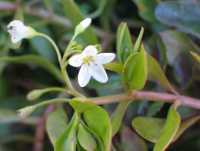Plants perennial, rhizomatous and stoloniferous, usually bulbiferous; rhizomes and stolons slender. Stems erect, aerial portion 2-32 cm, subterranean portion 1-15 cm. Leaves opposite, petiolate; blade oblanceolate to rhombic or ovate, short, 2-60 × 1-20 mm. Inflorescences ebracteate. Flowers 2-10, often replaced by bulbils; sepals 2-4 mm; petals 5, white or pink, 2-4 mm; stamens 5, anther pink or lavender. Seeds 1-1.5 mm, tuberculate; elaiosome present. 2n = 22.
Flowering May-Aug. Wetlands, riverbanks and streamsides from low to high elevations of coastal valleys and mountains; 500-3700 m; B.C.; Alaska, Ariz., Calif., Colo., Idaho, Iowa, Minn., Mont., Nev., N.Mex., N.Y., Oreg., Pa., Utah, Wash., Wyo.
A related species, Montia calcicola Standley & Steyermark, occurs in the Guatemalan highlands.
General: Perennial, 2-30 cm tall; stems erect, slender; rhizomes and stolons slender; plants producing bulbils.
Leaves: Cauline, opposite, oblanceolate, rhombic, or ovate, 0.2-6 cm long, 1-20 mm wide, glabrous, margins entire; blades petiolate.
Flowers: Solitary, sessile, showy; sepals 2, ovate, 4-9 mm long, paired at a right angle to the 2 subtending bracts, these resembling the sepals; petals 5-9, obovate, white, sometimes with pink veins or pinkish; flowers March-May.
Fruits: Capsule, obovoid, 3-valved; seeds 1-3, black.
Ecology: Wet meadows, streambanks, montane habitats; 2100-2900 m (7000-9500 ft) Apache, Coconino, Gila, Greenlee, and Navajo counties; western U.S. and Canada.
Notes: This creeping perennial roots at the leaf nodes and has at least 2 pairs of opposite leaves per stem. It is a lax, somewhat succulent plant, and grows in submerged or partially submerged habitats.
Editor: Springer et al. 2008
Erect perennial 5-20 cm, colonial from long, slender rhizomes and long, slender, subnaked stolons, both of these often with bulblet-like offsets; lvs spatulate or obovate, 2-5 cm; fls mostly 3-10 in lax, terminal and axillary racemes, on pedicels 1-3 cm; sep 2-3 mm; pet 5, white or pinkish, 5-8 mm; stamens 5. Wet, often springy or boggy habitats; widespread in the w. cordillera; disjunct in ne. Io. and se. Minn.; also along the upper Delaware R. in Pa. June, July.
Gleason, Henry A. & Cronquist, Arthur J. 1991. Manual of vascular plants of northeastern United States and adjacent Canada. lxxv + 910 pp.
©The New York Botanical Garden. All rights reserved. Used by permission.



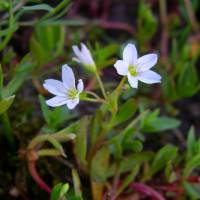
-mtn.jpg)
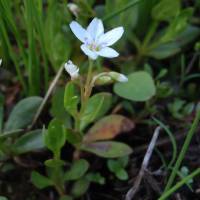
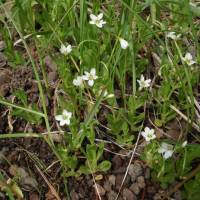
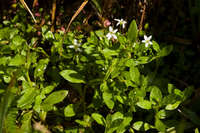
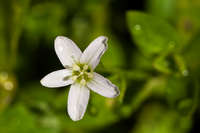
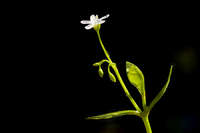
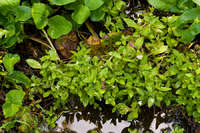
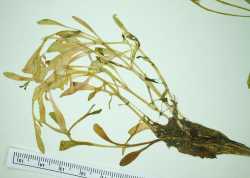
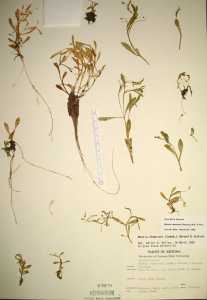
-mtn.jpg)
